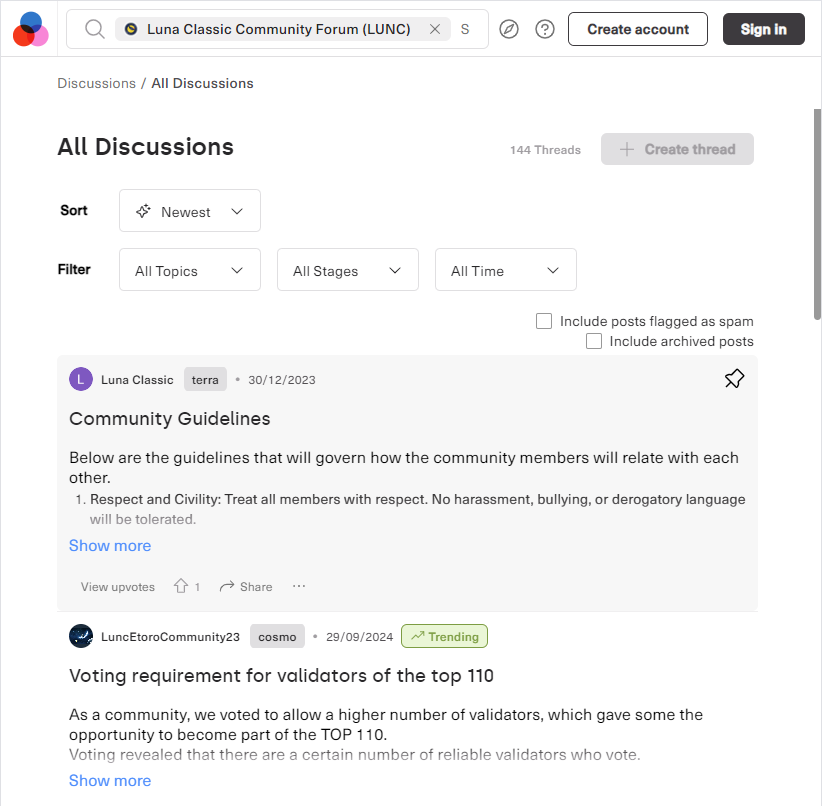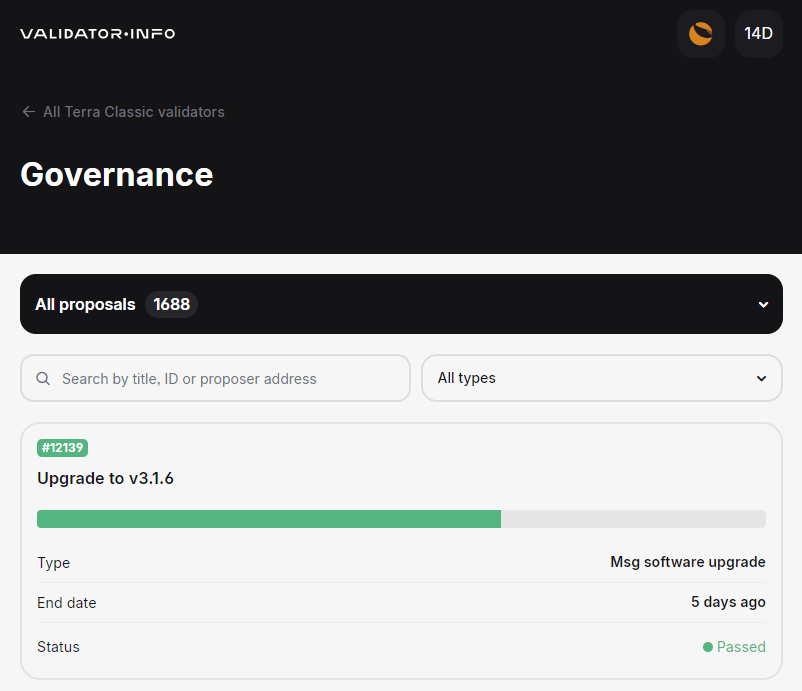Terra Classic governance refers to the process by which the Terra Classic community makes decisions about the future of the Terra Classic ecosystem. It involves voting on proposals, making changes to the network, and ensuring the long-term sustainability of the project.
Terra Classic governance is crucial for the success of the Terra Classic ecosystem. It allows the community to decide in the direction of the project, ensuring that it aligns with the needs and interests of its users. Additionally, effective governance can help to maintain the value and stability of Terra Classic blockchain.
Terra Classic's governance model is based on a delegated proof-of-stake (DPoS) consensus mechanism. This means that validators, who are individuals or organizations that run nodes on the Terra Classic network, are responsible for validating transactions and proposing governance changes.
LUNC holders can delegate their voting power to validators, who will then represent their interests in the governance process. Validators receive rewards for their services, which are proportional to the amount of LUNC they have staked.
LUNC governance proposals are submitted by validators or community members. These proposals are then voted on by holders who stake their LUNC. If a proposal receives a majority vote, it is implemented.
In addition to the formal governance process, LUNC also has a vibrant community that plays a significant role in shaping the project's direction. Community discussions and feedback can influence governance decisions and help to ensure that the project aligns with the needs and interests of its users.
As a LUNC holder, you have the power to influence the future of the Terra Classic ecosystem through voting on governance proposals. Here's what you need to know to exercise your voice:

The LUNC governance forum acts as the central hub for proposed changes. Here's your roadmap to staying informed:

While not an official LUNC tool, websites like validator.info can offer helpful summaries of proposals:
Validator.info rocks! However, always rely on official LUNC resources for the most accurate information.
The actual voting process will depend on the wallet you use to hold your LUNC tokens. Don't worry, the process is usually straightforward!
Terra Classic governance proposals can vary in scope and complexity. Here are some of the most common types of proposals you may encounter:
These proposals aim to modify the parameters of the LUNC network. This could include changes to:
These proposals suggest updates or upgrades to the LUNC software. Usually be a chain halt at specific block heigh, and let validators upgrade their software. This could involve:
These proposals aim to update existing smart contracts. This can be necessary to address security vulnerabilities, improve performance, or introduce new features.
These proposals are used for non-technical changes, such as updates to the governance rules or community guidelines.
It's important to understand the different types of proposals and their potential impact on the LUNC ecosystem. By familiarizing yourself with these categories, you can better evaluate proposals and make informed voting decisions.
Terra Classic governance employs a weighted voting system, meaning that the number of votes you have is proportional to the amount of LUNC you hold. This ensures that larger LUNC holders have a greater influence on governance decisions, while still allowing smaller holders to participate.
For a Terra Classic governance proposal to pass, it must meet 40% quorum requirement. This means that a minimum percentage of LUNC holders must vote on the proposal. The quorum requirement is designed to prevent proposals from passing without significant community support.
LUNC governance proposals typically have a 7-days voting period. During this time, LUNC holders can cast their votes for or against the proposal. Once the voting period ends, the results are tallied, and the proposal is either approved or rejected based on the voting outcome.
When voting on LUNC governance proposals, you have several options:
1. Yes: Voting "Yes" indicates your support for the proposal. If a proposal receives a majority of "Yes" votes and meets the quorum requirement, it will be approved. All deposited LUNC will return to the proposers.
2. No: Voting "No" indicates your opposition to the proposal. If a proposal receives a majority of "No" votes, it will be rejected. All deposited LUNC will return to the proposers.
3. No with VETO: When you are strongly agains the proposal, or vote on spam proposals. If a proposal receives 33% of "No with VETO" votes, it will be rejected, and the system take all of deposited LUNC and burn them.
4. Abstain: Voting "Abstain" means that you do not wish to vote for or against the proposal. Abstaining votes are not counted towards the total number of votes cast.
Understanding the Different Vote Types
It's important to understand the different types of votes and their implications. By casting your vote strategically, you can help to ensure that LUNC governance decisions align with the best interests of the community.
The Terra Classic governance system calculates the voting results based on the weighted voting system and the quorum requirement. If the proposal receives a majority vote and meets the quorum requirement, it is considered passed. Otherwise, it is rejected. Here is the steps:
1. Votes need to pass quorum (40%)
2. Votes must have NO with VETO less than 33%.
3. YES votes must be greater than NO + NO with VETO votes.
Terra Classic governance thrives on active participation. By staying informed, engaging in discussions, and casting your vote, you contribute to a healthy and thriving Terra Classic ecosystem. Remember, your voice plays a crucial role in shaping the future of LUNC!
Important Note: Information regarding where to cast your vote depends on your chosen wallet or validator. Always consult the official documentation of your chosen platform for specific voting instructions.
The content provided on this platform is intended for informational and educational purposes only, and should not be construed as financial advice, recommendation, or solicitation to buy, sell, or hold any cryptocurrency or investment. Investing in cryptocurrencies and other digital assets carries significant risks, including the risk of loss of principal. It is essential to conduct thorough research and due diligence before making any investment decisions.
Always consult with a qualified financial advisor to assess your financial situation and risk tolerance before making investment choices. The author and publisher of this content are not responsible for any financial losses incurred as a result of relying on the information provided herein.